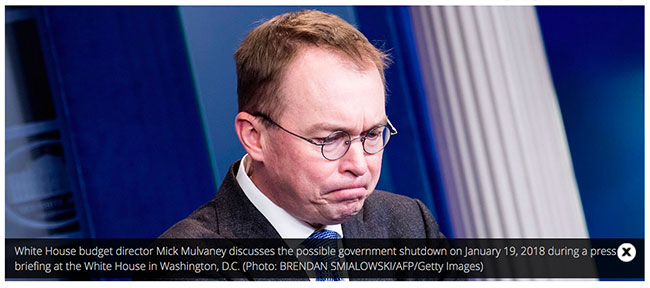‘Definition Of Tyranny:’ Mulvaney Asks Congress To Fix Liz Warren’s Agency

By Thomas Phippen
DailyCaller.com
President Donald Trump’s administration is urging Congress to reshape the Sen. Elizabeth Warren-crafted consumer finance agency before it can be used as a tool for “tyranny.”
“The [Consumer Financial Protection] Bureau is far too powerful, with precious little oversight of its activities,” CFPB acting director Mick Mulvaney said in a statement Monday. “The power wielded by the Director of the Bureau could all too easily be used to harm consumers, destroy businesses, or arbitrarily remake American financial markets.”
Mulvaney released a semi-annual report to Congress Monday, detailing the CFPB’s work between April and September 2017, when Obama appointee and current Ohio gubernatorial candidate Richard Cordray led the bureau.
“The structure and powers of this agency are not something the Founders and Framers would recognize,”Mulvaney argued in his letter accompanying the report. The CFPB appears tyrannical in that it appears to accumulate “legislative, executive, and judiciary, [powers] in the same hands,” Mulvaney suggested, quoting from James Madison’s “Federalist Number 47.” Such an accumulation of power “may justly be pronounced the very definition of tyranny,” Madison wrote.
The CFPB director’s role, as the Dodd-Frank Act defined, simultaneously fills roles: “as a one-man legislature empowered to write rules to bind parties in new ways; as an executive officer subject to limited control by the President; and as an appellate judge presiding over the Bureau’s in-house court-like adjudications,” Mulvaney said.
Conservatives have attacked the CFPB for being unconstitutional since its inception. On top of the powers designated to the role of CFPB director — the only political appointee in the agency’s structure — the president cannot remove a director without significant cause, according to the Dodd-Frank Act. If Congress doesn’t amend the structure, the Supreme Court may eventually hear a case about the constitutionality of that structure.
Mulvaney asked Congress to make four changes to the Dodd-Frank Act in order to make the CFPB more accountable:
1. Fund the Bureau through Congressional appropriations;
2. Require legislative approval of major Bureau rules;
3. Ensure the Director answers to the President in the exercise of executive authority; and
4. Create an independent Inspector General for the Bureau.
Mulvaney’s CFPB dodged oversight from Congress, Warren clams — one the interim director appears to agree with. The bureau has no dedicated inspector general and has little accountability to Congress since it’s budget isn’t subject to the normal appropriations process.

(RELATED: An Exclusive Peek Into Elizabeth Warren’s Luxurious CFPB Headquarters)
“Since Mr. Mulvaney took control, he has ignored congressional mandates, turning the CFPB into the politicized rogue agency he accused it of being before,” Warren wrote in a March 28 Wall Street Journal op-ed. Warren complained Mulvaney has systematically ignored the requirements of the bureau, including the collection of sensitive information from banks under examination — something Mulvaney halted in December 2017, citing lax cyber security within the CFPB.
Mulvaney addressed the concerns in his letter, saying he knows many members of Congress are displeased with his actions as director, just as other members didn’t like Cordray’s actions. “Such continued frustration with the Bureau’s lack of accountability to any representative branch of government should be a warning sign that a lapse in democratic structure and republican principles has occurred,” Mulvaney said. “This cycle will repeat ad infinitum unless Congress acts to make it accountable to the American people.”
Trump appointed Mulvaney, who continues to serve as the director of the White House’s budget office, to lead the CFPB temporarily after Cordray resigned in November 2017. Trump has not yet nominated a new director.





















